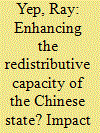| Srl | Item |
| 1 |
ID:
081530


|
|
|
|
|
| Publication |
2008.
|
| Summary/Abstract |
Many observers contend that fiscal deprivation of the centre in reform China is detrimental to the overall capacity of the Chinese state, and thus the danger of national disintegration cannot be discarded. One relevant concern here is the obligation of the state to redress socio-economic dislocations, of which growing regional inequality is a major issue. The Tax Sharing Scheme introduced in 1994 represents the most colossal effort to redress the centre-local imbalance. The analysis of the patterns of income and expenditure of county finance between 1993 and 2002, however, highlights the many facets of state capacity and reiterates the possibility of state involvement amidst an improved fiscal position. The success in extractive capacity in this case does not guarantee parallel improvement in the central government's redistributive capacity. Analysis of local expenditure patterns shows that the growing support of the centre simply fails to reverse the declining level of local services in areas that may be targeted as key for poverty alleviation and equalization. The danger of the simple reading of the rise in extractive capacity attributed to the 1994 reform as a symptom of a strong central state is evident.
|
|
|
|
|
|
|
|
|
|
|
|
|
|
|
|
| 2 |
ID:
167389


|
|
|
|
|
| Summary/Abstract |
Uncertainties about the amount of resources needed to combat climate change, dwindling local resources, limited local autonomy and limited expertise constrain local governments (LGs) in their response to the effects of climate change. As a result, financing climate change remains a major nightmare for LG actors across diverse nested territorial containers. It certainly requires the embracing of a multifaceted approach – the use of system thinking where local governments’ resource husbandry is optimised to support external aid and central government transfer. A multifaceted approach brings onboard blended resources, diverse stakeholders, diverse resource mobilisation skills and schemes, and accountability measures. Also, given projected increases in future climate-induced public expenditure, albeit with uncertainties, reliance on a single resource mobilisation approach will be a recipe for inefficiency. This article argues that developmental aid and central government’s transfer remains inadequate to meet the increasing demand for adaptation cost at the local level in Ghana. In the face of the unequivocal impact of climate change risk, we contend that local resource husbandry must be optimised through different innovations to complement other major sources of financing. Our contention resonates with the school of thought that argues local level resources are more resilient to politicisation, are stable, and are predictable compared to international aid and central government transfer. Through qualitative in-depth interviews, empirical data has been drawn from local governments in Ghana to justify our claims.
|
|
|
|
|
|
|
|
|
|
|
|
|
|
|
|